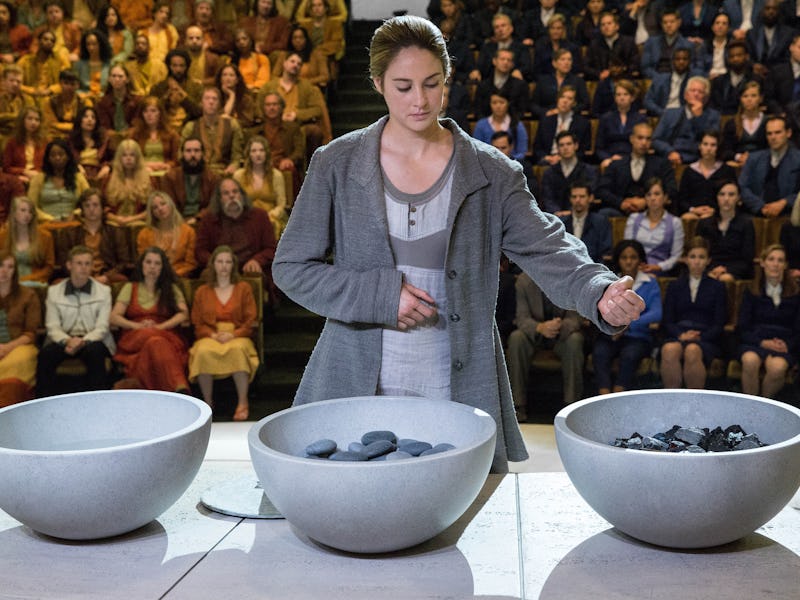Divergent Was A Franchise Goldmine. Why Didn’t Its Adaptation Work?
The 2014 film might have been too late to capitalize on the YA craze — but that’s not the only thing that doomed the Divergent saga.

Beatrice Prior (Shailene Woodley) doesn’t like having to choose. All her life she’s been told what to do, and for 16 years, she’s done it — no questions asked. Once she comes into her own, though, and is subjected to a mental test within the comfort of her own internal monologue, she isn’t scared to ask why. Nor is she afraid to say no.
That reluctance to choose outright — and that urge to ask questions, despite the consequences — is a big part of who Beatrice is. It’s what makes her “Divergent,” a rare individual that’s unable to fit into the constructs of her segregated, dystopian society. In this near-future image of Chicago, citizens are divided into five factions. Those who can’t conform are hunted down before they can cause any dissent, which forces Beatrice (later known as just “Tris”) to commit herself to one faction in the hopes of maintaining the status quo.
Like its heroine, Divergent was also keen to keep things just as they were. Ten years ago, young adult dystopia was dominating the zeitgeist. The hysteria effectively began with Twilight, found its second wind with The Hunger Games, and tried its damndest to keep up the momentum with a number of copycats. Divergent was one of many, and it was all-too-comfortable relying on the YA formula. It had all the makings of the next page-to-screen sensation: a plucky heroine; a surly love interest; a stifling, divided society; a rabid fanbase generating a ton of hype. Despite its potential, though, Divergent still stumbled — but was it because the YA train had already left the station, or because the same story had already been told in so many successful iterations?
Divergent is set at least a hundred years into the future, in the walled-off city of Chicago. Here, its citizens are sorted between the public servants of Abnegation, the police state of Dauntless, the law-loving Candor, the agrarian hippies of Amity, and the bookish scientists of Erudite. Everyone is born into one, but each year, a crop of 16-year-olds take an aptitude test and are later allowed to choose the faction of their choice. It’s Harry Potter’s Sorting Hat by way of The Matrix, and it’s here that Tris — born into the self-denying sect of Abnegation — first learns that she’s Divergent.
Even though she’s scored high in Abnegation, Dauntless, and Erudite, Tris can only choose one if she doesn’t want to rock the boat. She’s told by her proctor (Maggie Q) that Divergents are being hunted. By whom, she doesn’t say — but it doesn’t really matter once Tris shocks everyone and chooses Dauntless. The faction trains soldiers to defend the city, but they’re characterized by train-jumping, tattoos, and other such tenets of anarchy, so Tris assumes she’ll fit right in.
Alas, despite working her way up the ranks and getting cozy with intelligence officer Four (Theo James), Tris still finds herself struggling to conform. Dauntless leadership subjects her to one mental test after the next, forcing her to find new ways to trick the system. This, along with some hair-raising feats of courage, push Divergent into a real action-thriller. If the film were merely about Tris’ fierce initiation into Dauntless (and, of course, her romance with Four, who’s prime Surly Boyfriend material), it probably would have been a hit. Unfortunately, it all starts to fall apart once the hunt for Divergents traipses into truly Orwellian territory, pushing the series into the first of many harebrained twists and setting the stage for an obligatory civil war.
Divergent is all about resisting conformity — a theme played to perfection but its Big Bad, Kate Winslet’s Jeanine Matthews.
Divergent truly feels like the culmination of a near-decade’s worth of adaptations. The action-heavy novel it’s based on, written by Veronica Roth, takes the juiciest parts of Harry Potter and The Hunger Games while subverting the most annoying bits of stories like Twilight. Tris is not nearly as fragile or lovelorn as Bella Swan; like Katniss Everdeen, she’s got a warrior’s heart. And while Divergent is without a doubt her story, Roth’s series does eventually gain a co-lead in the form of her love interest, Four. Since so many studios were trying to chase the high of The Hunger Games: Catching Fire — which raked in almost as many male fans as it did female, an important distinction for the genre — Divergent really checked all the boxes.
It’s in translating all that potential that the 2014 film truly starts to stumble. Director Neil Burger, and screenwriters Evan Daugherty and Vanessa Taylor, do a fair job in sharpening the themes of Roth’s novel. Their adaptation is streamlined and unsentimental, but it’s also bleak in a way that squeezes any life out of the film. It takes way too much influence from the overly serious actioners of the 2010s, weighing down an otherwise-engrossing story with an ill-fitting tone.
The romance between Tris and Four is the beating heart of an otherwise bleak adventure.
You could argue that Divergent hit the scene too late to capitalize on the YA craze, but a solid film, no matter the subject, should also be able to rise above its native genre. Divergent’s failures are more due to its weak story, one riddled with plotholes and bogged down by a grave tone, than they are to their environment. The film wasn’t a total failure, especially as a standalone, but Lionsgate and Summit Entertainment wanted another viable franchise. They wanted to keep riding the YA wave — but without anything new to bring to an already-struggling genre, not even Divergent stood out from the crowd.